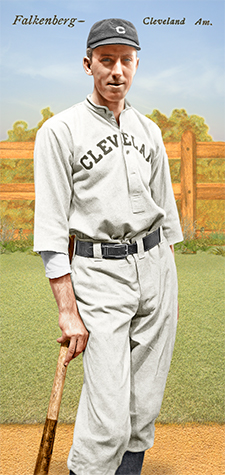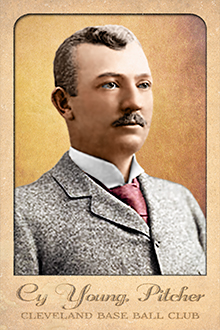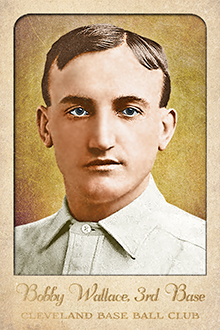- Series: Pilgrims
- City: Cleveland
- Team: Naps
- League: American League
Frederick Peter Falkenberg (1879-1961) pitched for 7 ML clubs over a 15-year career from 1903-17, laboring in obscurity and mediocrity until he emerged in 1913 (at age 32) with a secret weapon that transformed him into a world-beater. For one meteoric season he went 23-10 with a 2.22 ERA using the “emery ball,” a legal but dubious pitch that practitioners kept on the down-low.
- In 1914, lured to the new Federal League, he continued his success for one more year
- The Federal League and Falkenberg both flamed out the following year
- Retired to San Francisco and became an entrepreneur for his favorite game: bowling
Auction History
Cartophilia
T201 Mecca Canvas: Cy Falkenberg
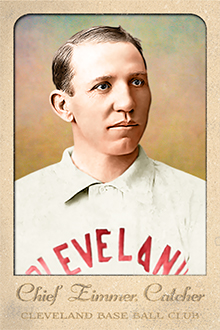
- Series: Pioneer Portraits II: 1875-1899
- City: Cleveland
- Team: Spiders
- League: National League
Charles Louis Zimmer (1860-1949) was one of the great catchers the game has known. As Cy Young’s receiver from 1890-98, Chief was extolled by the great pitcher as a peerless partner. The two grew up together with Cleveland with Zimmer setting numerous records at his position while guiding the nascent talent that would come to define baseball greatness. Perhaps fittingly, when Young left Cleveland after the ‘98 season, the club let the 38-year-old Zimmer go, too. He was spared the indignity of laboring for next year’s “worst team in history” club that went 20-134. Chief went on to a pennant with Pittsburgh in 1901, catching HOF’er Jack Chesbro. In ‘03 Pirate owner Barney Dreyfuss persuaded Zimmer to move to Philadelphia to manage the Phillies before retiring at 42.
- Zimmer claimed no Native American heritage. The “Chief” was due to being the team leader on an early club so speedy as to be dubbed “Indians”
- The Sporting Life wrote in 1890 that Zimmer was one of about 6 major leaguers who abstained from both liquor and tobacco. Despite his aversion to smoking, Zimmer made a fortune selling cigars, spreading his business to every city his ball club visited
- Was elected 1st president of The Players’ Protective Association – predecessor to the MLB Players’ Association
- An entrepreneur and wise investor, Zimmer was known to be one of the wealthiest players of his day
- Zimmer famously invented Zimmer’s Base Ball Game, a mechanical parlor game popular in the 1890s
- Series: Pioneer Portraits II: 1875-1899
- City: Cleveland
- Team: Spiders
- League: National League
- Hall: National Baseball Hall of Fame
Denton True Young (1867-1955) embodied excellence among ML pitchers. Baseball waited one year after his death to establish the award for annual greatness in his honor. Young’s 511 wins are still the hallmark. In 19 of his 21 seasons, he was in the top 10 in innings pitched. With Nap Lajoie, Young gave the upstart AL credibility when he jumped to the new circuit in 1901.
- In his 30s & 40s, led Boston’s Red Sox to 192 victories
- Pitched the 1st perfect game from 60’6”, beating Rube Waddell on 5/5/04
- Elected to Hall of Fame: 1937
- Series: Pioneer Portraits II: 1875-1899
- City: Cleveland
- Team: Spiders
- League: National League
- Hall: National Baseball Hall of Fame
Rhoderick John Wallace (1873-1960) had a Hall of Fame career as a premier shortstop for 24 years before going on to one of the longest tenures in MLB as coach, manager, scout & even a short stint as an umpire. Playing primarily in St. Louis for the Cardinals & Browns, Wallace set records, including a mournful one: longest career by a player to never make the World Series.
- Too good a fielder to stay on the mound, became the premier defensive SS of his era
- In 1911, Pirates’ owner declared Wallace the one player in the AL he desired above all others
- Elected to Hall of Fame: 1953
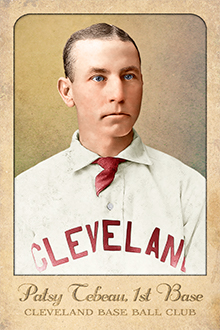
- Series: Pioneer Portraits II: 1875-1899
- City: Cleveland
- Team: Spiders
- League: National League
Oliver Wendell Tebeau (1864-1918) played first and third-base for five ML teams from 1887-1900. He was player-manager for three of those clubs 11 of his 13 seasons, squaring off with his arch-rival John McGraw and his Orioles. Tebeau led Cleveland during the rough-and-tumble era closing the 19th century. His obituary said he belonged to “the blood and iron brigade of baseball.” It was said that when the Spiders and Orioles met, “wild war raged up and down the field.” The august founding father of the game, Henry Chadwick, wrote in 1896 that Tebeau “degraded the game more than any player of the previous quarter century.” But the Cleveland fans loved Patsy and the League’s attempts to silence him soon faded.
- After retiring from the diamond, Tebeau ran a successful saloon in St. Louis
- Patsy couldn’t endure his wife’s decision to leave him and take the kids back to Cleveland. After his death at his own hand the local paper headlined: “Patsy Tebeau Acts as His Own Umpire”
